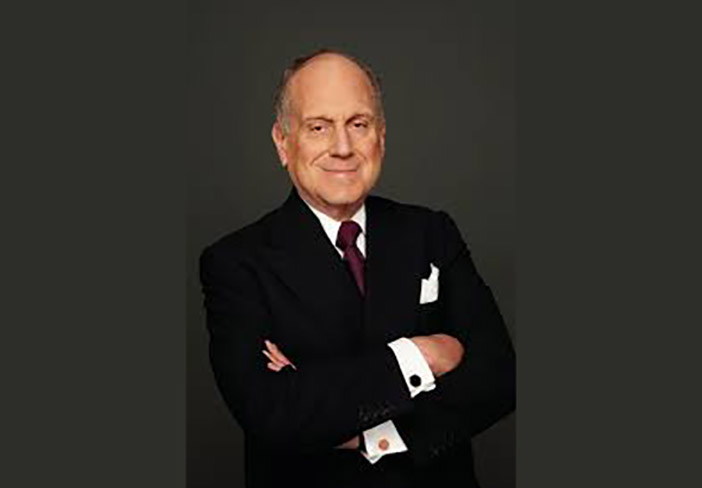Lauder: The Jewish People Are Ready to Face any Challenge
The following is a Passover interview with Ronald S. Lauder, originally published by The Jewish Voice
JV: It’s a tumultuous time around the world—here in the U.S., in Europe, across the Middle East, even in Israel. What should Jews be thankful for this Passover?
RSL: We should celebrate not just our freedom from slavery, but our strength as a people. Yes, there are some worrying signs of divergence and disagreement, but there are even more signs of unity. Jewish communities flourishing across the globe. The two-thousand-year-old dream of a sovereign Israel is a beautiful reality, from which Jews everywhere draw strength and inspiration. The are of the quiet Jew is long behind us; the Jewish people are ready to face any challenge.
JV:Thinking about those challenges, what are the most pressing issues for world Jewry today?
RSL: Rising anti-Semitism threatens Jews in Israel and around the world. We must be ever-vigilant to confront this age-old scourge wherever and however it rears its ugly head, including on new fronts like social media. At the same time, we need to look within, and ask ourselves what can be done about the fact that so many young Jews lack the same sense of peoplehood—amiyut—and a connection to Israel that my generation had. Intermarriage and assimilation rates are rising, and different denominations are growing further apart. We need to educate the next generation to embrace their religion, their Jewish identity, and their homeland, the State of Israel.
JV: Yes, according to recent polls, support for Israel among younger American Jews, especially those who identify as politically liberal, is declining. What do you make of this shift, and what can be done to reverse it?
RSL: American support for Israel has been strongest and most resilient when it has been bipartisan. Unfortunately, gaps have emerged and there are forces—including some on the left—that want to drive a wedge into Jewish solidarity with Israel. The BDS movement is one of these forces, though so far it remains largely defeated and marginalized.
It is our responsibility to adequately explain to young American Jews the importance of backing Israel, including how Zionism fits into a liberal and progressive outlook. We at the World Jewish Congress have conducted our own polling. We understand the challenge, what needs to be done about it, and we’re going after the root causes to expose BDS’s lies. We need to do better to get our messages out—the truth about Israel—to reinforce and strengthen the support the Jewish state needs and deserves.
JV: Pharaoh is sometimes called the world’s first anti-Semite. How threatening is anti-Semitism to the Jewish people today?
RSL:The story of Passover teaches us that the Jewish people are resilient, and it also reminds us to be humble and to appreciate our modern freedoms, for we know the bitter experience of bondage and slavery. Passover also bestows a lesson of activism, of the importance of taking fate into our own hands and to be fearless in defending our faith and our freedom.
That’s a lesson that still resonates today, when anti-Semitism remains a constant and evolving threat. That’s why I’m working with former NYPD Commissioner Ray Kelly, one of the world’s most respected security experts, on a project to assess the security requirements of certain Jewish communities in Europe. I’m also traveling from country to country with the World Jewish Congress, meeting senior officials and heads of government to work on solutions. In fighting anti-Semitism, we must be vigilant and united.
JV: Poland’s senate recently passed a controversial bill that outlaws blaming Poland for crimes committed during the Shoah. You’ve forcefully condemned the law. What do you think is the path forward there?
RSL:This bill brought a firestorm of ill-will and should have no bearing on the Jewish revival happening there. Jewish life in Central and Eastern Europe is finally recovering from the Second World War, and, in Poland, bilateral relations with Israel have never been stronger. The entire controversy should be dialed back, and I hope to see Polish and Jewish leaders sit down to get back to where everyone belongs—as friends, neighbors and fellow citizens.
JV:Israel has historically been a political punching bag at the United Nations. Do you think that’s beginning to change under Nikki Haley?
RSL: Ambassador Haley’s voice at the United Nations has been a breath of fresh air. Decades of deep-seated hostility and unfair treatment of Israel can’t be changed overnight, but she has already made incredible progress by reaffirming American strength and demanding justice in the U.N.’s halls. I’m pleased to call Ambassador Haley my friend, I pray for her strength and success, and I know that our community is cheering for her.
JV: Do you see other signs of hope for improved relations between Israel and the global community?
RSL: Dialogue is key to improving relations. That is why I am committed to supporting institutions of higher education, like Israel’s cutting-edge Technion and the IDC in Herzliya, and it’s why I established an employment center in the Negev, in cooperation with Ben-Gurion University, in order to increase opportunities for Jews and Arabs. It is also why I started an “Olive Branch” project to facilitate discussions between Muslims, Jews and Catholics. Dialogue humanizes conflict, and education gives individuals and communities a stake in our shared future.
JV:From Saudi Arabia to Lebanon to Yemen, the Middle East’s political landscape is undergoing tectonic changes. How would you characterize Israel’s position in this evolving environment?
RSL: Israel has shown itself to be a strong and adaptive geopolitical player, constructing strategic alliances, countering the existential threat of a nuclear Iran and collaborating in the fight against terrorism. For example, there’s been unprecedented intelligence sharing on ISIS between Israel, Egypt and Jordan. The rest of the Middle East is starting to see that a strong Israel is a source of stability, and the world is finally understanding that the problems of the Middle East cannot be pinned on Israel.
JV: What about the stalled peace process? Why do you believe so strongly in the necessity of a two-state solution?
RSL: The pursuit of peace is vital to preserving Israel’s character as a Jewish and democratic state. A fundamental tenet of Zionism is that the Jewish people should be free, sovereign, safe, and secure in our own land. Although there have been setbacks and failures, there are still majorities on all sides that want peace. The two-state solution remains a top priority for me. I believe that Prime Minister Netanyahu, President Abbas and President Trump have a unique chance to achieve progress and enable Israelis and Palestinians to build bridges toward a more promising future for both peoples.
JV: A theme of Passover is being a stranger in another land. The Israeli government recently announced that it would deport tens of thousands of African migrants. Is that the right decision?
RSL:Given the Jewish people’s own troubled past, I believe that Israel must always have open arms, especially for anyone fleeing mass atrocities and persecution. And it has: Israel has provided refuge for upwards of 60,000 Africans fleeing war and strife over the past 10-15 years. As for the Israeli government’s latest decisions, I hope an alternative path forward can be found, and the international community should also do more to assist Israel as it shoulders this unanticipated burden.
Many of the African migrants escaped gruesome conditions, thousands fled persecution and atrocities in Sudan, many were victims of trafficking and torture in Sinai, and thousands more fled Eritrea’s gulag, where young men face the prospect of seemingly indefinite conscription into a dictator’s army. Natan Sharansky has spoken out, as has former Attorney General and Supreme Court Justice Elyakim Rubinstein.
JV: Israel will soon celebrate its 70th birthday. What do you think the Jewish homeland will look like in another 70 years?
RSL: In the face of conflict, we tend to lose our optimism. But I am confident that in 70 years the fighting will be over. There will be peace and prosperity in Israel, with Jews and Arabs living together in harmony. I share Herzl’s dream and believe his vision of Zionism will continue to be fulfilled.





